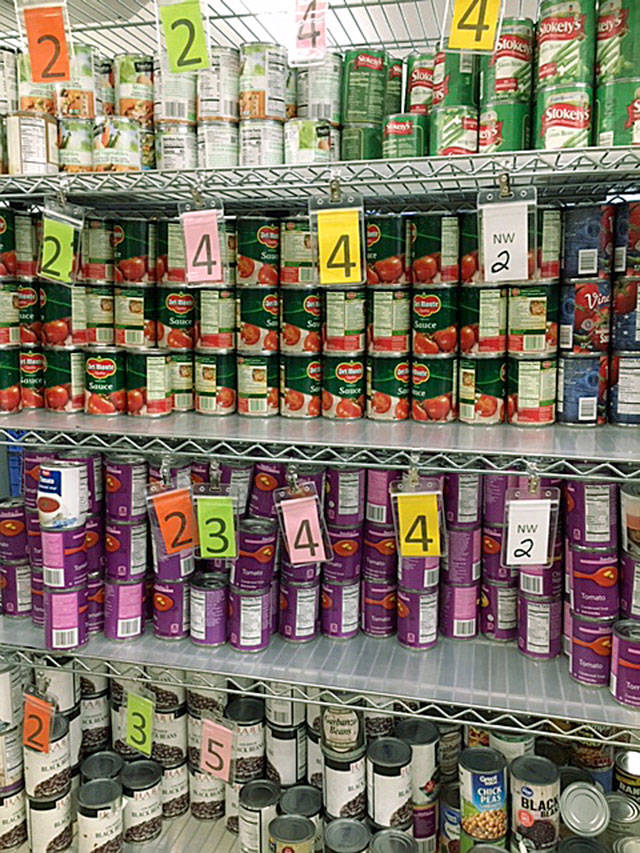In the past decade, food banks throughout the country have changed to a model that allows clients to take their shopping cart through aisles, pick their own groceries and “check out” at the end.
Debbie Christian, executive director of the Auburn Food Bank, likes the idea of client-assembled boxes so much she’s making it happen in Auburn.
With a little help from her friends.
“Our space has always seemed too small – but with help from Northwest Harvest and a small grant provided by them, we have chosen a layout that just may work for us,” Christian said Tuesday.
Here’s how it works:
Clients get their carts at the entrance, shop for groceries displayed in the room and check out with a volunteer at the end.
A color and a number is affixed to each category of food, telling clients to look for the color they are holding in their hand. The number on the card lets them know how much of that item they can have.
“We will learn to use the words, ‘You can have what you will use,’ which subliminally suggests, ‘Don’t take more than you need,’” Christian said. “Food banks across the nation have found this to be very successful in giving back dignity to those they serve. There is less food waste … as clients will use what they take instead of tossing what they didn’t want.”
Northwest Harvest provided $1,500 to make this happen, and then the Jon Bye Realty company, which also donated to the cause, stepped in and got the NFI Flooring company to donate new flooring.
Christian said the model is attractive for many reasons.
For one thing, she said, letting clients assemble their own food boxes respects them, their well-being and their dignity.
“There is no such thing as an average family or need. Every family your food pantry serves is unique. The notion that it is somehow better or fairer to give every family the same quantity and variety of food is just wrong,” Christian said.
After all, Christian asks, what sense does it make to give five days’ worth of help to a family that only needs a single day’s worth of help and to a family that needs 10 days worth of help? What is fair about giving an Anglo-American family that doesn’t eat rice and a Vietnamese-American family that eats mostly rice a one pound bag of rice each? What is fair, she asks, about giving dried beans to a family whose utilities have been cut off and so has no way to cook them?
What is fair about giving bacon to a family whose religion abhors pigs? What families will and will not eat, can or cannot use, is so unique to each family that ignoring or disregarding those differences is profoundly disrespectful of those families even if, and when, it stems from the purest of motives, Christian said.
Christian said evidence shows most people would prefer to pick out their own food, just as they would at a store. That they appreciate being given some idea of how much is fair, reasonable or OK for them to take, because when given the opportunity to take as much as they want to, a vast majority will most fear taking more than they should have, thereby depriving some other, possibly worse-off family, of the help it needs.
“It is truly heartwarming to observe this phenomenon,” Christian said. “Food banks that always have given out standardized food boxes, in part out of a fear that the poor are too greedy, irresponsible, dishonest or unscrupulous to be trusted, suddenly finding that when they switch to letting those clients pick out their own food, that those very same clients are actually very nice people who care very much about the well-being of others in need and about doing what is right.”



